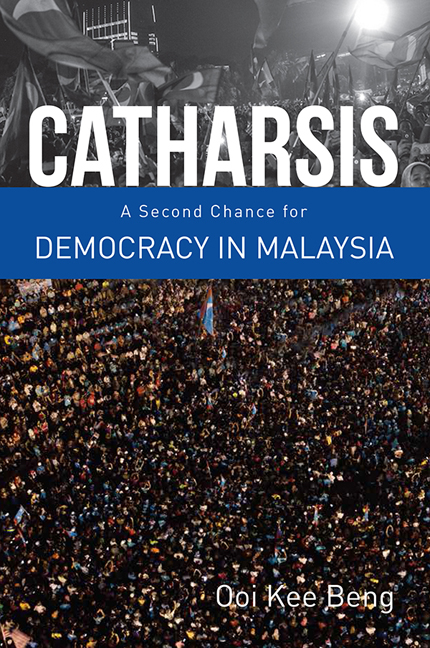Book contents
- Frontmatter
- Contents
- Foreword
- 1 Introduction – Malaysia's Future Is Redeemed
- Before Pakatan Harapan
- Before 9 May 2018
- 12 Racialising the Un-racialisable: What Is the Red Shirt Rally All About?
- 13 One Country's Merdeka Is Another's Damage Control
- 14 Malaysia – Where Politics Must Be Ethnically Inclusive and Exclusive at the Same Time
- 15 Is Malaysia at a Crossroads or in a Quagmire?
- 16 Unity Without Solidarity Sows Disunity
- 17 UMNO and Looking Back at History
- 18 Sarawak Forces Federal Opposition to Do Deep Soul-searching. But Can It?
- 19 By-elections Reveal New Malay Politics
- 20 Interview with Mahathir Mohamad: ‘People Must Be Able to Hold Their Heads Up.’
- 21 Malaysia Has to Start Re-examining Its Histories
- 22 Waves from US Probe into 1MDB May Turn into Tsunami
- 23 Seeking a New Formula to Unite Malaysia's Diversity
- 24 Time for Anwar to Accept Mahathir's Olive Branch?
- 25 Najib, Mahathir and the Timing of Malaysia's Polls
- 26 Excessive Governance Is Not Good Governance
- 27 Why Malaysia's Opposition Will Take to the Streets Again
- 28 Merdeka is About The Individual, Too
- 29 A Battle Between Malay Leaders Over Malaysia's Future
- 30 The Primacy of Political Economy in Asia
- With Mahathir at the Helm
- Beyond 9 May 2018
- About the Author
12 - Racialising the Un-racialisable: What Is the Red Shirt Rally All About?
from Before 9 May 2018
Published online by Cambridge University Press: 12 February 2019
- Frontmatter
- Contents
- Foreword
- 1 Introduction – Malaysia's Future Is Redeemed
- Before Pakatan Harapan
- Before 9 May 2018
- 12 Racialising the Un-racialisable: What Is the Red Shirt Rally All About?
- 13 One Country's Merdeka Is Another's Damage Control
- 14 Malaysia – Where Politics Must Be Ethnically Inclusive and Exclusive at the Same Time
- 15 Is Malaysia at a Crossroads or in a Quagmire?
- 16 Unity Without Solidarity Sows Disunity
- 17 UMNO and Looking Back at History
- 18 Sarawak Forces Federal Opposition to Do Deep Soul-searching. But Can It?
- 19 By-elections Reveal New Malay Politics
- 20 Interview with Mahathir Mohamad: ‘People Must Be Able to Hold Their Heads Up.’
- 21 Malaysia Has to Start Re-examining Its Histories
- 22 Waves from US Probe into 1MDB May Turn into Tsunami
- 23 Seeking a New Formula to Unite Malaysia's Diversity
- 24 Time for Anwar to Accept Mahathir's Olive Branch?
- 25 Najib, Mahathir and the Timing of Malaysia's Polls
- 26 Excessive Governance Is Not Good Governance
- 27 Why Malaysia's Opposition Will Take to the Streets Again
- 28 Merdeka is About The Individual, Too
- 29 A Battle Between Malay Leaders Over Malaysia's Future
- 30 The Primacy of Political Economy in Asia
- With Mahathir at the Helm
- Beyond 9 May 2018
- About the Author
Summary
Following the Red-Shirt rally in Kuala Lumpur on 16 September, discussions have been rife that the government of Prime Minister Najib Razak was ‘playing the racial card’ to bolster support and to distract the public, especially its Malay supporters, from distressing issues at hand.
It is true that the demonstration was a purely Malay rally, but what is essential to note is that while the initial impulse to organise it came from people who were undoubtedly trying to highlight and deepen the racial divide, by the time the event did take place, much of that had been deftly turned into a show of support for the beleaguered prime minister by his staunchest followers.
In the end, few incidents took place and the riot police did not have much trouble keeping rowdy demonstrators at bay, who were symbolically trying to get into the city's Chinatown.
This is an important point to highlight. The racialising did not spread.
The demonstration was an angry reaction by Mr Najib supporters to the anti-Najib Bersih 4.0 rally that took place on 29–30 August. Notwithstanding the huge turnout at that two-day event, some mass media outlets had focused on the proportionately low number of Malay participants at the Bersih rally.
This in sadly typical of Malaysian journalism, in fact—whatever happens, look for the racial aspect first. What should be read out of this is that the Bersih Movement has been very successful in achieving its main long-term goal. This is not so much electoral reforms as the gradual shifting of the national discourse away from persistent racial issues over to a passion for democratic governance instead.
Ever since it was formed by a large group of civil society organisations and opposition parties, Bersih (short for Gabungan Pilihanraya Bersih dan Adil—the Coalition for Clean and Fair Elections) has relied for support on its non-racial agenda of electoral reforms.
The latest version of its reforms are (1) free and fair elections; (2) a clean government; (3) the right to dissent; (4) strengthening parliamentary democracy; and (5) saving the Malaysian economy. These are generally so technical and generic in nature that one would be hard put to turn them into racial issues.
- Type
- Chapter
- Information
- CatharsisA Second Chance for Democracy in Malaysia, pp. 41 - 43Publisher: ISEAS–Yusof Ishak InstitutePrint publication year: 2018



